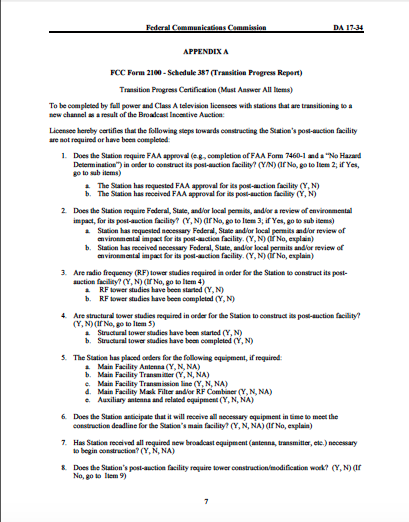NAB Asks for Repack Reporting Tweaks
The professional video industry's #1 source for news, trends and product and tech information. Sign up below.
You are now subscribed
Your newsletter sign-up was successful
WASHINGTON—Yes or no does not always the question answer, the National Association of Broadcasters told the folks at the Federal Communications Commission regarding a proposed form for periodic channel-repacking reports.
“While NAB generally believes the questions are substantively appropriate, many questions simply are not amenable to yes or no responses. Throughout the repacking process, broadcasters will face numerous uncertainties, and forcing a yes or no response in these circumstances will materially lessen the accuracy of the information the commission collects and makes available to stakeholders,” an NAB engineering team said in comments filed on FCC Public Notice DA-34, released Jan. 10, “The Incentive Auction Task Force and Media Bureau Release Transition Progress Report Form and Filing Requirements for Stations Eligible for Reimbursement From the TV Broadcast Relocation Fund and Seek Comment on the Filing of the Report by Non-Reimbursable Stations.”
The Public Notice contains the form in Appendix A, reproduced here at right (click to open .pdf in new window), and which contains 14 questions along the lines of, “ Does the Station require FAA approval... in order to construct its post-auction facility?” “Does the Station require Federal, State, and/or local permits, and/or a review of environmental impact, for its post-auction facility?”“Are radio frequency tower studies required in order for the Station to construct its post-auction facility?” and “Are structural tower studies required in order for the Station to construct its post-auction facility?”
The NAB had no beef with the reporting requirement per se, but rather the abbreviated, John Dingellesquity of the possible answers.
“For example, proposed question 8 asks if a station’s post-auction facility will require tower construction or modification work. Many broadcasters will be wholly unable to provide any meaningful response to this question until tower studies have been completed.” the NAB team stated.
The NAB agreed with the commission's proposal to have stations that are not eligible for reimbursement from the $1.75 billion repack set-aside.
“These stations will in many cases be drawing on the same limited pool of resources as reimbursable stations as they seek to move to new channels,” the NAB team said. “Further, their progress is no less important than that of reimbursable stations when it comes to clearing the new wireless band for forward auction winners.”
The NAB parted company with the FCC proposal to require the reports quarterly as well as 10 weeks before a station’s construction deadline, 10 days after construction is complete, and five days after the station ceases operation on its pre-auction channel. How about every six months, plus the 10-week prior and shutdown report, with some event-related flexibility, the NAB proffered. Additionally, the NAB requested group reporting versus one for each station.
Finally, the NAB emphasized that completion of auxiliary antenna systems should not be tied to shutting down the main signal on its pre-auction channel if the station isn’t ready to fire up the transmitter on the new, reassigned frequency, as one of the questions appears to suggest: “Has the station completed all testing on its new auxiliary antenna system such that it may now cease broadcasting on its pre-auction channel?”
The NAB team responded that, “No station should be required to cease operation on its pre-auction channel until construction on its primary facilities is complete.“ Further, it concluded that “the commission must not seek to compel broadcasters to operate with significantly diminished facilities solely to maintain the fiction that its arbitrary 39-month deadline for the completion of repacking is achievable.”
For more TV Technology coverage, see our spectrum auction silo.
Also see...
Jan. 10, 2017
“FCC Seeks Feedback on Repack Reporting Process”
Stations eligible for reimbursement comprise all full-power and some Class A stations involuntarily assigned to a new channel. The PN said a “small number of Class A stations are not protected during the repacking process, and if displaced as a result of repacking will not be eligible for reimbursement.”

The professional video industry's #1 source for news, trends and product and tech information. Sign up below.
